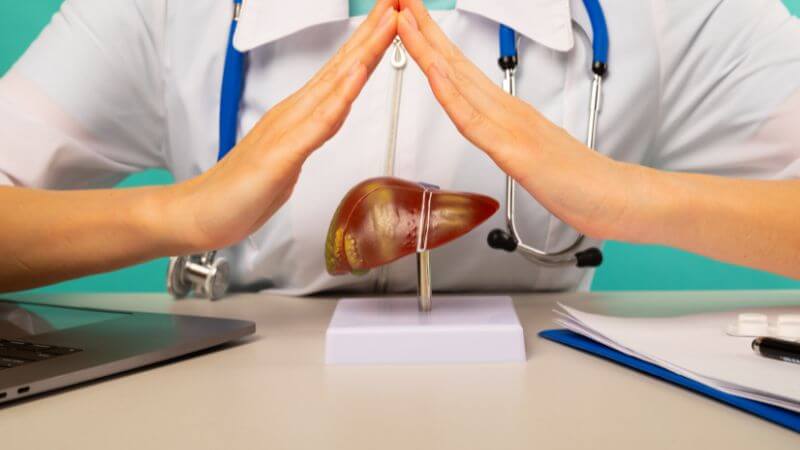Which is the largest gland in the body? Salivary gland Pancreas Lacrimal gland Liver. The liver, the largest gland in human body, is a remarkable organ with multifaceted functions. This article explores the pivotal role of the liver, its anatomy, vital functions, and essential care for maintaining overall health.
What Is The Largest Gland In Human Body?

The largest gland in the human body is the liver. Situated in the upper right side of the abdomen, just below the diaphragm, the liver is a vital organ with multifaceted functions.
It weighs approximately 3 pounds (1.36 kilograms) in the average adult. The liver’s primary roles include detoxifying the blood, processing and storing nutrients, synthesizing proteins, and producing bile, which aids in digesting fats.
It also plays a crucial role in regulating blood glucose levels. Furthermore, the liver has an astonishing capacity to regenerate, allowing it to recover and maintain its essential functions even after injury or partial removal. Source
Largest Gland In Human Body Function
The largest gland in the human body, the liver, performs a multitude of crucial functions:
- Metabolism: The liver is central to metabolism, converting nutrients from the food we eat into energy, storing glycogen for later use, and regulating blood glucose levels.
- Detoxification: It filters and detoxifies the blood, removing toxins, drugs, and metabolic waste products.
- Bile Production: The liver produces bile, which is essential for digesting fats. Bile is stored in the gallbladder and released into the small intestine to emulsify fats for absorption.
- Protein Synthesis: It synthesizes important proteins, including clotting factors, albumin, and enzymes required for various bodily functions.
- Storage: The liver stores vitamins (such as A, D, E, K, and B12), iron, and glycogen for future use.
- Immune Function: It plays a role in immune response by removing bacteria and other foreign particles from the blood.
- Blood Regulation: The liver helps regulate blood composition, including cholesterol levels.
- Regeneration: The liver has an incredible ability to regenerate damaged tissue, allowing it to recover from injuries or partial removal.
In summary, the liver is a vital organ involved in metabolism, detoxification, digestion, and numerous other essential functions necessary for maintaining overall health and homeostasis in the body. Source
Caring For Largest Gland In Human Body
Caring for the largest gland in the human body, the liver, is essential for overall health. Here are some tips on how to care for your liver:
- Maintain a Healthy Diet:
- Eat a balanced diet rich in fruits, vegetables, whole grains, and lean proteins.
- Limit saturated fats, refined sugars, and processed foods.
- Avoid excessive alcohol consumption, as it can damage the liver.
- Stay Hydrated:
- Drinking plenty of water helps the liver flush out toxins and maintain proper function.
- Exercise Regularly:
- Engage in regular physical activity to help control weight and improve overall health, which benefits the liver.
- Limit Alcohol and Avoid Drug Abuse:
- Excessive alcohol and drug use can damage the liver. Follow recommended guidelines or abstain from these substances.
- Practice Safe Sex and Get Vaccinated:
- Hepatitis B and C can lead to liver damage. Practicing safe sex and getting vaccinated can reduce the risk of infection.
- Be Cautious with Medications:
- Follow medication instructions carefully, and consult a healthcare professional about potential liver side effects.
- Maintain a Healthy Weight:
- Obesity can lead to fatty liver disease and other liver conditions. Aim for a healthy weight through diet and exercise.
- Get Vaccinated Against Hepatitis:
- Vaccines are available for hepatitis A and B. Getting vaccinated can prevent these viral infections that can harm the liver.
- Manage Chronic Conditions:
- If you have chronic conditions like diabetes or high blood pressure, manage them effectively, as they can affect liver health.
- Avoid Excessive Supplements:
- Excessive intake of certain supplements, like vitamin A, can harm the liver. Take supplements only as recommended by a healthcare provider.
- Practice Safe Needle Use:
- If you use needles for medical purposes or recreational drug use, ensure they are sterile and never share them.
- Regular Check-ups:
- Visit your healthcare provider regularly for check-ups and liver function tests, especially if you have risk factors or a family history of liver disease.
Trivia!
Question: Where is the liver located in the human body?
- Answer: The liver is located in the upper right side of the abdomen, just below the diaphragm.
Question: What is the primary function of the liver?
- Answer: The liver has numerous functions, but its primary functions include detoxifying the blood, metabolizing nutrients, and producing bile to aid in digestion.
Question: How much does the average adult human liver weigh approximately?
- Answer: The average adult human liver weighs about 3 pounds (1.36 kilograms).
Question: What is the role of the liver in metabolism?
- Answer: The liver is involved in various metabolic processes, including the conversion of nutrients into energy, the synthesis of proteins, and the regulation of glucose levels in the blood.
Question: What is cirrhosis of the liver, and what causes it?
- Answer: Cirrhosis of the liver is a condition characterized by scarring and damage to the liver tissue. It is often caused by chronic alcohol abuse, viral hepatitis, or other liver diseases.
Question: What is the significance of bile produced by the liver?
- Answer: Bile, produced by the liver, is essential for the digestion and absorption of fats in the small intestine. It emulsifies fats, making them easier to digest by enzymes.
Summary!
In conclusion, the largest gland in human body, i.e. the liver’s significance cannot be overstated. Its pivotal role in metabolism, detoxification, and overall well-being underscores the importance of nurturing and protecting this vital organ. Prioritizing liver health is an investment in a healthier future.
Also Read: TOP 20 HIDDEN RAW MANGO BENEFITS
Follow Us: Facebook | Instagram | Twitter | Pinterest













Leave a Reply